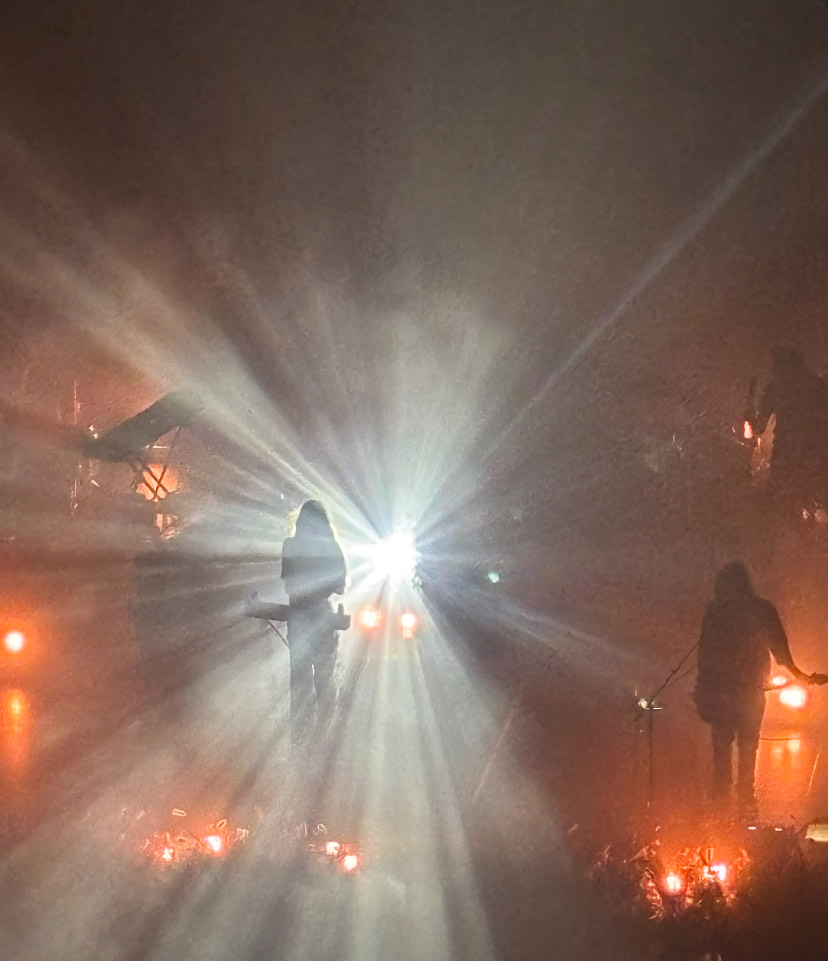
At first, the number of people cramming themselves into 10K for a Friday night poetry slam seems shocking. The seats inside the small room fill quickly and many spectators must resign themselves to leaning against walls or sitting on the floor. Despite the apparent discomfort, the room buzzes with excitement, people eagerly awaiting the first performer to take the stage.
But no one is silent, even as the poet begins to speak. This is MacSlams and the audience is encouraged to open up about their feelings and to react as their emotions are touched upon.
“I love the reactions that I get from my poetry,” Natalie Kaplan ’17 said. “Slam poetry is cool because it’s interactive. People will snap and make noise and afterwards, come up to you and say, ‘Thank you for doing that poem,’ or ‘that’s something that really resonated with me.’”
“[Slam poetry] has a lot of life to it,” Oliver Schminkey ’16 agreed. “Most people think of poetry as something really dull and inaccessible, but slams get rowdy and participatory.”
Openness, on the part of both the audience and the poets, is a key part of the activity. Performers often draw upon personal identities in their writing, reveling in the public display of who they are and the events that have shaped them.
“It’s scary,” Kaplan admitted. “But it’s really empowering to be vulnerable on a stage in a controlled way, where I know what I’m going to say. I get to be open with people on my own terms.”
For many poets, the act of revealing secrets to the public is what creates confidence.
“The first time I did a poem about being trans, I remember how nerve-wracking it was,” Schminkey said. “It’s like coming out to people over and over again, being publicly outed as trans. It means something to be out, to be visible. But it can be really empowering. I remember one of my friends went up and the first slam poem she ever did was about her mom dying. Being able to stand up in front of a room of 50 people and talk about how you felt when your mom died, that’s powerful.”
Slam poetry is centered on sharing stories and creating community that can appreciate and help process the experiences one might have.
“It’s meaningful to figure out things in my life and put them into words,” Talia Young ’17 said. “Slam poetry is a venue that gives me a voice.”
Most slams, however, consist of more than the presentations of poetry. They also include judging. A number of judges are selected from the audience, who are then expected to rate each poem on a scale of one to 10. At Macalester, these scores can determine if a poet will go on to compete at a national level. Despite the high stakes of the competition, the judges are always untrained.
“There’s no one way to judge poetry,” Kaplan said, justifying this choice. “There’s no one good type of poetry. How would you qualify judges for poetry? It’s also making fun of ourselves. Putting numbers to art is sort of ridiculous.”
But for some poets, this form of adjudication can be stressful and frustrating. In describing her experience at the College Union Poetry Slam Invitational (CUPSI), Young pointed out how the competitive aspect of slams does present some difficulties.
“[It’s] a double-edged sword,” she said. “It’s something that brings the crowds and brings people to slams. They like seeing someone win. But it can be stressful as a writer. Certain subjects and forms of writing do well. It can feel hard to navigate between what you know will do well and what feels real to you.”
The arduous process of preparing to compete, which involves creating and revising multiple rough drafts and practicing for up to 25 hours a week, can become strained by the thought of this judgment. But most poets have ways of reminding themselves of what really matters when it comes to the slams.
“It’s not a real competition. By the end of the night, what does a score really mean?” Schminkey asked. “I always tell people, ‘this is just people judging you out loud instead of inside their heads.’”
Instead of worrying about the scores, poets choose to focus on the powerful stories that they and their peers tell.
“Something I say before slams is, ‘It doesn’t matter what the scores are. Someone in the room needs to hear your poem tonight,’” Kaplan said. “The audience is real and even though there’s a score aspect, it’s also about sharing to the entire room, not just to the judges.”
And free of the fear of disappointing judges, the slam poets at Macalester focus instead on the emotional journey that writing a poem can entail. While competitions set a time limit of three minutes, slam poetry is absent of any rigid standards or style.
“Ideally, there is no process,” Young said. “Certain things do well in slam, like builds, where you increase in volume and intensity, or hammers, which are lines that get something complex in a succinct one-liner that people snap at often.”

Many slam poets begin their work in MacSlams workshops, during which they respond to specific prompts or practice freewrites. For others, writing can be less of a choice.
“Some poems I write because a poem needs to be written,” Schminkey said. “That slowly gets refined. That’s a lot of time to digest your trauma and figure out what to talk about.”
Inspiration for a poem can strike at any time, even if it seems random.
“I have a journal with a lot of rough drafts. Sometimes I’ll just write what I’m thinking about,” Kaplan explained. “I like to perform stuff that’s saying things that other people aren’t saying, that feels new and genuine.”
While the unexpected emotions that poets reveal and evoke are very real, the tone of a piece is well-rehearsed and intentional. Poets learn to modulate their voice or volume in order to communicate their experiences to the audience.
“Most of it’s an act. I’m a performer. It’s almost my job to make people feel things,” Schminkey admitted. “On one hand, it’s knowing how to do your art, and on the other hand, it’s channeling the emotions you feel on a daily basis so it can be processed and given to the world.”
Slam poetry operates on a deeply personal level. It’s the presentation of personhood, the act of holding aloft one’s most vulnerable parts for the world to see.
“It’s this super intense, creative community with a united goal,” Schminkey explained. “And if I didn’t have slam poetry, I wouldn’t know how to talk about things that are really important to me.”







Gabrielle Mitchell • Sep 5, 2019 at 10:10 am
I just couldn’t depart your website before suggesting that I really enjoyed the standard information a person provide for your visitors? Is going to be back often in order to check up on new posts